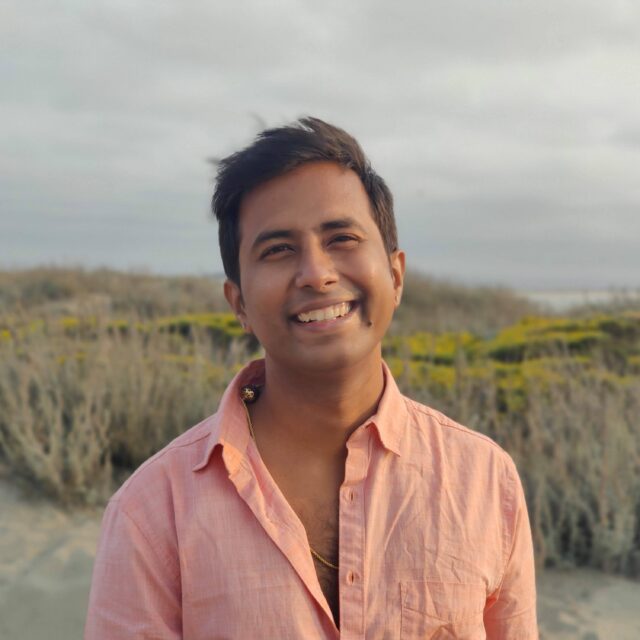Balakrishnan Raghavan is an accomplished musician, researcher, and educator.
He is a doctoral student in cross-cultural musicology at the University of California Santa Cruz. Bala’s work focuses on oral traditions of music across the Indian subcontinent, with an emphasis on the politics of spirituality, sacred songs, South Asian performing traditions, mystical traditions, caste, gender, and sexuality. He is a STEM-trained computer science engineer as an undergraduate, and an Arts/Humanities/Social Science trained doctoral student. Bala trained for over twenty years in traditional vocal music, including a two-year-long immersive discipleship with South Indian Classical musician Dr.R.Vedavalli and fifteenth-century mystic poet-saint Kabir’s philosophy and songs from Shri.Prahlad Tipaniya. With over ten years of interdisciplinary performance experience, he attempts to re-imagine the many ways of looking at traditional music from India, centering the marginalized experience at the intersection of song, immigration, race, sexuality, personal narrative, transnational experience, and performance.
TITLE OF PRESENTATION: Performing Utopia: South Asian Heterodox Spi/ritual Song as a Site of Hope for the Marginalized
ABSTRACT
In Cruising Utopia, Jose Munoz gestures toward a methodology of hope as ‘a backward glance that enacts a future vision.’ I extend Munoz’s provocation through south Asian spiritual music traditions from the past and contemporary queer stories for a forward-dawning queer futurity. Drawing on my lifelong training in pan-Indian spiritual music traditions, South Indian classical (Carnatic) music, and my research in music, poetry, gender, sexuality, and the labor of breath, this talk explores the queer possibilities in sacred music traditions from India. This emerges from my musical-storytelling performance juxtaposing contemporary queer narratives with Bhakti, Sufi poem-songs, and padams (Carnatic amorous love poem-songs). What these South Asian expressive traditions have in common were relatively egalitarian pathways to salvation through divine union based on the poetic and musical medium and topic of love. Many saint-musician-poets came from subordinated caste and class groups, provided heterodox spiritual orientations, and found social mobility through ‘ecstatic song.’
Re-staging queer stories in performance, I straddle binaries between the languorous musicality of the sacred song and the affective reality of the queer story. It is a multisensory negotiation across borders of musical notes, caste and class locations, time and space, gesturing towards ‘a movement across’ that musicologist Eve Sedgwick calls queer. Scholars Chambers and Son argue how, for queer people of color, everyday life can be an experience of constant negation, and that performance becomes a way of creating places not only for our minoritized singular selves but also for the experience of ‘being-together’ and ‘being-in-difference.’ Through performance, performance making, and a queer re-staging of the sacred-profane song, I explore a possible practice to build newer worlds and narratives to create and foster safer spaces of being for queer people of color. How generative could queering and performing this music through stories be for the queer racialized body?
